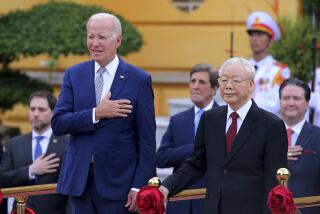American Firms Can Reap Bounty in Vietnam Business, Group Says
- Share via
HANOI, Vietnam — American companies could share in as much as $9 billion worth of trade and investment if the 19-year economic embargo against Vietnam is lifted, according to the director of a business group.
“Americans could participate in $6 billion in trade and $2 billion or $3 billion in investment,” Virginia B. Foote said following a U.S. Senate vote Thursday urging the Clinton Administration to lift the embargo.
Foote, director of the Washington-based United States-Vietnam Trade Council, said in a telephone interview that she expects a decision by President Clinton quite soon, perhaps within the week.
The Senate vote is not legally binding.
“It’s still the President’s decision,” Foote said. “They haven’t changed that dynamic, (but) I think the President will take this Senate vote very seriously.”
Vietnam’s Ministry of Foreign Affairs hailed the vote as a “positive action required by the current reality and in accordance with the aspirations of the American people.”
“We hold that this action will be approved by American public opinion as well as in the world,” ministry spokeswoman Ho The Lan said.
Vietnam offers a market of 70 million consumers, a large pool of inexpensive labor and oil and coal resources. Mobil Corp. has already won bidding for the right to explore for oil off southern Vietnam. But until the embargo is lifted, it can collect only seismic data and is barred from producing or selling oil from the offshore field.
Meanwhile, International Business Machines Corp. and Digital Equipment Corp. have signed agreements to help Vietnam with $300 million in information technology purchases over the next seven years.
Among the opponents of lifting the embargo are veterans groups and members of the families of 2,238 Americans unaccounted for in Indochina from the Vietnam War, including 1,647 in Vietnam.
The American Legion, the largest veterans group in the United States, with 3.1 million members, said in a statement issued in Hanoi that veterans and POW-MIA families will take their case to the White House.
“Rather than give the President ‘political cover,’ the Senate has ensured that the President will have to personally decide whether to abandon the families of our POWs,” said Bruce Thiesen, commander of the American Legion.
Clinton has said that before he will lift the embargo, he must be satisfied that Vietnam has cooperated in giving the fullest possible accounting of the MIAs. In the last two months, a series of Administration officials and senators have visited Vietnam and reported that Hanoi is doing so.
The United States first imposed sanctions against North Vietnam in 1964 at the start of the war. It extended the embargo to all of Vietnam in 1975 after communist North Vietnam took over the South, which had been supported by the United States.
Some American business officials in Hanoi saw the Senate action as another indicator that the time has come to put the war behind and look to a future of economic and diplomatic relations.
“This is just one more in a series of indications that virtually every sector of American government has stood very publicly and said it’s time to lift the trade embargo and to get on with normalizing relations,” said Peter Ryder.
Ryder is president of Manolis & Company Asia Ltd., which runs a real estate development and investment firm in Hanoi. Officials of his company have been traveling to Vietnam for the last two years and established a representative office here last summer.
American firms can open offices, make contacts, gauge the market and sign contracts with Vietnamese counterparts, but they cannot do any business. The only exceptions are for sales of humanitarian goods and for work on development projects such as highways and bridges financed by international lending institutions. There are 35 U.S. companies with offices in Hanoi and Ho Chi Minh City.
More to Read
Inside the business of entertainment
The Wide Shot brings you news, analysis and insights on everything from streaming wars to production — and what it all means for the future.
You may occasionally receive promotional content from the Los Angeles Times.










